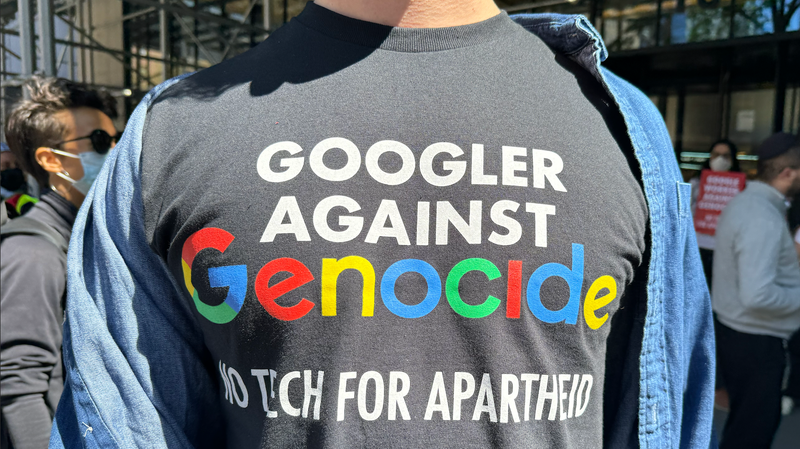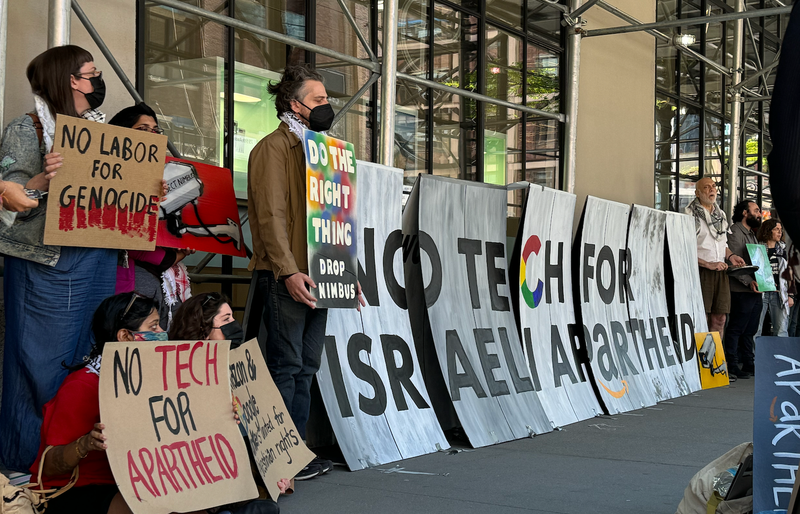'Googlers Against Genocide': Tech Workers Protest AI and Cloud Contracts With Israel

More than 10 workers held a sit-in on the 10th floor of Google’s New York City headquarters on Tuesday to protest Google’s ties to Israel, organizers from “No Tech for Apartheid” tell Gizmodo. The New Yorkers were joined by a simultaneous sit-in inside of Google Cloud CEO Thomas Kurian’s office in Sunnyvale, California. The protestors demand their company drop Project Nimbus, a $1.2 billion contract held by Google and Amazon to provide AI and cloud computing services to the Israeli government and military.
“Our desired outcome would be for Google to drop Project Nimbus, and really all support for the Israeli military,” said Cheyne Anderson, a Google software engineer and No Tech For Apartheid organizer in a phone interview with Gizmodo. “How can you stand by and continue to do business as usual with the news that’s coming out of Gaza?”

The movement opposing Google’s ties to the Israeli military is growing within the company, Anderson tells Gizmodo. The Israeli Finance Ministry called Google and Amazon’s Project Nimbus an all-encompassing cloud solution for the country’s “defense establishment” in 2021. No Tech for Apartheid seeks greater transparency around how Israel’s military is using Google’s services. A Google DeepMind researcher told Time last week that cloud providers often have limited insight into the servers of their government clients.
Current and former Google employees spoke to a crowd of riled-up protestors on the streets of Manhattan Tuesday. One current Google employee at the rally, who asked to remain nameless, told Gizmodo that the building’s security asked him and other protestors to leave Google’s office during their sit-in. He said other Googlers refused to leave, and would stay sitting until they were removed.
Protest of Google’s Project Nimbus contracts with Israel happening outside of Google’s NYC office right now pic.twitter.com/Yu1stm1hQz
— Max Zeff (@ZeffMax) April 16, 2024
Another one of the speakers was Eddie Hatfield, a 23-year old software engineer who Google fired last month for interrupting an executive’s presentation by yelling “No tech for apartheid!” at an Israeli tech conference.
“I absolutely think my firing was to intimidate my coworkers from doing something like this today,” said Hatfield in an interview with Gizmodo with protestors chanting behind him. “Everyone’s always asking how they can support me. This is what supporting me looks like.”
Part of Tuesday’s No Tech for Apartheid protest is about reinstating Hatfield. A Google spokesperson told The Verge that Hatfield was fired for interfering with a company-sponsored event, not for the specific thing the employee yelled.
BREAKING—PRO-PALESTINE @googlecloud ENGINEER DISRUPTS @Google ISRAEL DIRECTOR AT GOOGLE-SPONSORED ISRAELI TECH CONFERENCE IN NYC.
The worker demanded that Google STOP using worker labor to power genocide against Palestinians in Gaza. #NoTechForApartheid pic.twitter.com/t2mqCqFFay— No Tech For Apartheid (@NoTechApartheid) March 4, 2024
“Google claims Eddie was fired for interrupting another employee’s presentation, which apparently is a greater breach of ethics than the war profiteering that Google’s executives engage in,” Anderson said.
Google did not immediately respond to Gizmodo’s request for comment.
There’s no evidence to suggest Google or Amazon’s technology has been used in the killing of civilians. However, recent reporting from +972 magazine suggests that Israel is using an advanced AI system called “Lavender” to label citizens in Gaza as targets on a kill list. Israel is known for using another AI system in warfare called “The Gospel,” to select bombing targets in Gaza. The cloud provider powering these AI systems is not currently known, though a fairly advanced computing infrastructure is likely required.
No Tech for Apartheid represents a growing concern within tech about how AI is used in warfare. Time previously reported that two workers quit over the concerns about Google’s involvement with the Israeli government. Tech has always played a role in warfare, though some of Google’s workers would like it not to.

